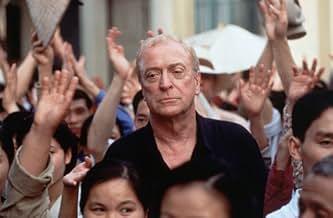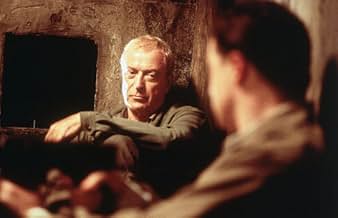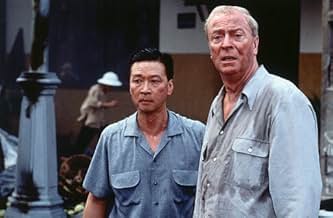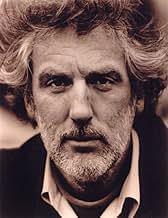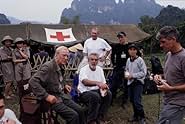An old British reporter vies with a young U.S. doctor for the affections of a beautiful Vietnamese woman.An old British reporter vies with a young U.S. doctor for the affections of a beautiful Vietnamese woman.An old British reporter vies with a young U.S. doctor for the affections of a beautiful Vietnamese woman.
- Director
- Writers
- Stars
- Nominated for 1 Oscar
- 13 wins & 14 nominations total
Do Thi Hai Yen
- Phuong
- (as Thi Hai Yen Do)
Rade Serbedzija
- Inspector Vigot
- (as Rade Sherbedgia)
Ha Phong Nguyen
- Muoi's Henchman
- (as Nguyen Ha Phong)
- Director
- Writers
- All cast & crew
- Production, box office & more at IMDbPro
Featured reviews
In Saigon, 1951, Thomas Fowler (Michael Fowler) is an English journalist, married in England with a catholic woman, and in love with a Vietnamese girl, Phuong (Do Thi Hai Yen). Thomas meets Alden Pyle (Brendan Fraser) in a bar. Pyle is a doctor working in an aid mission, and pretty soon, he falls in love with Phuong. Pyle offers her what Thomas is not possible to give, i.e., a marriage and escape of Vietnam. Meanwhile, the political situation in Vietnam is boiling, with the French trying to get control again of the country, the communists trying to impose their system to the South, and the American secretly giving support to a third Vietnamese part.
This romance is perfect: the outstanding performance of Michael Caine in the first plane, and Brendan Fraser (in his best role, since 'Gods and Monsters') and Do Thi Hai Yen are fantastic. The screenplay of Christopher Hampton, based in a novel of Graham Greene, is wonderful. And the direction of Phillip Noyce is magnificent, presenting the story in right doses of romance, drama, action and special effects. An overwhelming movie for all tastes. My vote is nine.
Title (Brazil): "O Americano Quieto" ("The Quiet American")
This romance is perfect: the outstanding performance of Michael Caine in the first plane, and Brendan Fraser (in his best role, since 'Gods and Monsters') and Do Thi Hai Yen are fantastic. The screenplay of Christopher Hampton, based in a novel of Graham Greene, is wonderful. And the direction of Phillip Noyce is magnificent, presenting the story in right doses of romance, drama, action and special effects. An overwhelming movie for all tastes. My vote is nine.
Title (Brazil): "O Americano Quieto" ("The Quiet American")
THE QUIET AMERICAN, Phillip Noyce's adaptation of the Graham Greene novel, is among that small subgenre of films (THE YEAR OF LIVING DANGEROUSLY, UNDER FIRE, SALVADOR) where journalists, writing in war-torn countries, discover conspiracies that undermine everything they've come to accept as true. These films are inevitably controversial, as they deal with actual places and historical events, and they demand an open mind, as they often portray governments in a less-than-flattering light. While the revelations of the stories aren't always entirely true, each film of this group are well-crafted, and certainly thought-provoking.
The film is told as a flashback, as the corpse of murdered American Alden Pyle (Brendan Fraser) is found, floating in the Mekong, in 1952. During the French police investigation, the story unfolds...
Thomas Fowler (Oscar-nominated Michael Caine) is a veteran British journalist ("I prefer reporter," he jokes), writing in Saigon as the French fought the Communists in Indochina. Jaded and complacent, he only sporadically submits an article, devoting his time to a mildly hedonistic lifestyle, and his beloved mistress, beautiful young Phuong (portrayed by the stunning, if not overly talented Vietnamese actress, Do Thi Hai Yen). When young Pyle arrives, purportedly joining the American mission to treat eye disease among the Vietnamese, the older man is immediately impressed by his quiet, respectful, almost naive innocence. Introducing the American to Phuong, Pyle is immediately attracted to her, and, upon discovering Fowler already has a wife, in England, he begins wooing the girl, much to the chagrin of the reporter.
As his paper is threatening to return Fowler to England, taking him away from Phuong, he announces he is involved in a major story in the north, and leaves to investigate reports of Communist activities. What he finds is a massacre, with responsibility denied by both sides. Joined by Pyle ("I didn't want to propose to Phuong behind your back"), the pair barely make it back alive. Although the 'official' story blames the Communists for the deaths, Fowler doesn't believe it, and begins investigating in earnest.
A new military leader emerges, General Thé, opposed to both the French and the Communists, and Caine suspects his forces as the true perpetrators of the massacre. Visiting the elusive general's headquarters, he finds Pyle running a clinic, and the General apoplectic when he asks who is providing the arms and funds for his army. Again, with Pyle's assistance, he barely escapes with his life...and a growing suspicion that the United States is taking a less than neutral role in the intrigue...
While the film's climax will come as a surprise to no one, and the 'love triangle' lacks much spark (other than from Caine, who is totally believable when he confesses that without Phuong he would "start to die"), the film is engrossing, throughout. Brendan Fraser, as the enigmatic title character, does a very credible job in a complex role, after a somewhat shaky first meeting with Caine. The lack of chemistry between him and Hai Yen could easily be explained away as a natural reticence from her character towards any man saying "I love you", in a society where sexual favors are easily purchased. She seems far more comfortable and believable in her scenes with Caine, despite their major age difference.
Ultimately, the film is a triumph for Michael Caine, who again proves why he is one of the finest actors of his generation. As a man who goes from indifferent complacency to active participant by the film's climax, he is never less than superb.
This is certainly one of the better films of 2002!
The film is told as a flashback, as the corpse of murdered American Alden Pyle (Brendan Fraser) is found, floating in the Mekong, in 1952. During the French police investigation, the story unfolds...
Thomas Fowler (Oscar-nominated Michael Caine) is a veteran British journalist ("I prefer reporter," he jokes), writing in Saigon as the French fought the Communists in Indochina. Jaded and complacent, he only sporadically submits an article, devoting his time to a mildly hedonistic lifestyle, and his beloved mistress, beautiful young Phuong (portrayed by the stunning, if not overly talented Vietnamese actress, Do Thi Hai Yen). When young Pyle arrives, purportedly joining the American mission to treat eye disease among the Vietnamese, the older man is immediately impressed by his quiet, respectful, almost naive innocence. Introducing the American to Phuong, Pyle is immediately attracted to her, and, upon discovering Fowler already has a wife, in England, he begins wooing the girl, much to the chagrin of the reporter.
As his paper is threatening to return Fowler to England, taking him away from Phuong, he announces he is involved in a major story in the north, and leaves to investigate reports of Communist activities. What he finds is a massacre, with responsibility denied by both sides. Joined by Pyle ("I didn't want to propose to Phuong behind your back"), the pair barely make it back alive. Although the 'official' story blames the Communists for the deaths, Fowler doesn't believe it, and begins investigating in earnest.
A new military leader emerges, General Thé, opposed to both the French and the Communists, and Caine suspects his forces as the true perpetrators of the massacre. Visiting the elusive general's headquarters, he finds Pyle running a clinic, and the General apoplectic when he asks who is providing the arms and funds for his army. Again, with Pyle's assistance, he barely escapes with his life...and a growing suspicion that the United States is taking a less than neutral role in the intrigue...
While the film's climax will come as a surprise to no one, and the 'love triangle' lacks much spark (other than from Caine, who is totally believable when he confesses that without Phuong he would "start to die"), the film is engrossing, throughout. Brendan Fraser, as the enigmatic title character, does a very credible job in a complex role, after a somewhat shaky first meeting with Caine. The lack of chemistry between him and Hai Yen could easily be explained away as a natural reticence from her character towards any man saying "I love you", in a society where sexual favors are easily purchased. She seems far more comfortable and believable in her scenes with Caine, despite their major age difference.
Ultimately, the film is a triumph for Michael Caine, who again proves why he is one of the finest actors of his generation. As a man who goes from indifferent complacency to active participant by the film's climax, he is never less than superb.
This is certainly one of the better films of 2002!
I don't understand why the studio satraps thought it necessary to embargo this film after 9/11, requiring persuasion on Michael Caine's part to get it to limited release now so as to qualify for Oscar nominations. The American role in Viet Nam is the subject of hundreds of books and countless articles - and not a few films. There is nothing unhealthy about the continuing debate and contrary to what some opine, I doubt American policy vis-a-vis Iraq has much lineal connection to the troubled saga of U.S. involvement in Indo-China, or its partial successor in hapless interest, the Republic of Viet Nam.
The Graham Green story has been filmed before (1958) but this is a pungent, attention-grabbing version, filmed in various parts of Viet Nam. The sultry and grasping humidity of the land almost comes off the screen. The story takes place in 1952 as the inept and poorly led French stumble towards their ultimate debacle at Dien Bien Phu (anyone interested in this story should start and finish with Bernard Fall's remarkable account of the French Army's Super-Alamo).
Caine, a Brit named Fowler, assures Brendan Fraser, a putative U.S. humanitarian officer named Pyle, that he is a "reporter," not a "correspondent." The difference to the easy-living Fowler is that the latter has a viewpoint, perhaps even a cause, while the former, as Sergeant Friday would say, only wants the facts.
This film really belongs to Caine and Fraser but one other character, the stunning Do Thi Hai Yep, Fowler's live-in girlfriend, deserves mention. She lights up the screen with both her calculating passion for, first, Fowler and then Pyle. Her character is realistically complex: I knew a number of such women when I was an Army officer and although the phrase isn't used here, she's a perfect example of the desperately ambitious, beautiful mistress whose only long-term goal is to be taken to "The Land of the Big P.X."
A series of experiences transform both Fowler and Pyle. Several of the scenes of violence are real enough but the music is intrusive. You don't hear music when people are dying around you. At least not performed by an orchestra.
This is the third recent film in which Michael Caine distinguishes himself by the depth of his acting (the others being "The Cider House Rules" and "Last Orders"). Caine's Fowler leaves us wondering as to what his motives are as he slowly changes before us. There's no clear answer and room for argument. His Fowler is both disturbing and ingratiating.
The audience in the East Village theater where I saw "The Quiet American" today clearly was made up of folks whose minds were settled as to U.S. involvement in Indo-China, never mind the later escalation in Viet Nam. Their grunts and laughs at certain points reflected their views. But the story told here is a faithful mirror of what in 1952 were complex questions in a scary world made scary by communism, not the liberal democracies. That mistakes of a grievous nature were made may be clear today but the road was ill-illuminated then. This film, and Caine's portrayal in particular, reflects the contemporary confusion and the unravelling of any hopes for a peaceful reunification of the two Viet Nams after the French defeat.
I hope this film gets a very wide distribution after it finishes its two-week Oscar-qualifying run.
8/10.
The Graham Green story has been filmed before (1958) but this is a pungent, attention-grabbing version, filmed in various parts of Viet Nam. The sultry and grasping humidity of the land almost comes off the screen. The story takes place in 1952 as the inept and poorly led French stumble towards their ultimate debacle at Dien Bien Phu (anyone interested in this story should start and finish with Bernard Fall's remarkable account of the French Army's Super-Alamo).
Caine, a Brit named Fowler, assures Brendan Fraser, a putative U.S. humanitarian officer named Pyle, that he is a "reporter," not a "correspondent." The difference to the easy-living Fowler is that the latter has a viewpoint, perhaps even a cause, while the former, as Sergeant Friday would say, only wants the facts.
This film really belongs to Caine and Fraser but one other character, the stunning Do Thi Hai Yep, Fowler's live-in girlfriend, deserves mention. She lights up the screen with both her calculating passion for, first, Fowler and then Pyle. Her character is realistically complex: I knew a number of such women when I was an Army officer and although the phrase isn't used here, she's a perfect example of the desperately ambitious, beautiful mistress whose only long-term goal is to be taken to "The Land of the Big P.X."
A series of experiences transform both Fowler and Pyle. Several of the scenes of violence are real enough but the music is intrusive. You don't hear music when people are dying around you. At least not performed by an orchestra.
This is the third recent film in which Michael Caine distinguishes himself by the depth of his acting (the others being "The Cider House Rules" and "Last Orders"). Caine's Fowler leaves us wondering as to what his motives are as he slowly changes before us. There's no clear answer and room for argument. His Fowler is both disturbing and ingratiating.
The audience in the East Village theater where I saw "The Quiet American" today clearly was made up of folks whose minds were settled as to U.S. involvement in Indo-China, never mind the later escalation in Viet Nam. Their grunts and laughs at certain points reflected their views. But the story told here is a faithful mirror of what in 1952 were complex questions in a scary world made scary by communism, not the liberal democracies. That mistakes of a grievous nature were made may be clear today but the road was ill-illuminated then. This film, and Caine's portrayal in particular, reflects the contemporary confusion and the unravelling of any hopes for a peaceful reunification of the two Viet Nams after the French defeat.
I hope this film gets a very wide distribution after it finishes its two-week Oscar-qualifying run.
8/10.
1952. Siagon. English journalist Thomas Fowler lives a quiet life with his young mistress, Phuong and no intention to return to London. When the Times request he return he starts looking for stories to ensure he can stay. At the same time an idealistic young American arrives as part of a medical aid programme in the middle of the war between the French and the Communist forces in the North fighting for independence. The American, Pyle falls for Phuong and the two men discuss what can be done. However in any conflict it is impossible to stay neutral for long.
As the film rather bluntly says, the plot here is the same story told twice. That of the Americans trying to protect a beautiful country/girl from an unpleasant future (unmarried or communism) even if it means taking her away from her older European master (France or Fowler). The two plots work well even if they have flaws. The tale of the two lovers is less well handed than the critical political stuff but is still good and slightly moving. The political comment is less sharp now than I imagine it was when Greene made it all those years ago, but it will still have impact as America's foreign policy prepares to take it into another conflict overseas in order to remove/keep out forces it feels are harmful to America.
I assume that this is what Noyce wanted and he does it well. The alignment with the central love is not that well done, and this is shown by the fact that Pyle is given those lines to speak so clearly in case anyone missed it. The love story didn't work as well as it should partly because I needed more information for example Phuong's motives were never fully clear and her character was weakly developed throughout. However it didn't take too much away from the film as a total and I still enjoyed it very much.
One of the main reasons was the direction. I have recently seen Noyce's Rabbit Proof Fence and he worked well there. Again here he directs well with the bigger landscape shots but also does well with more intimate or action shots. He also brings an excellent performance out of Caine. He should really get an Oscar for this but I suspect he won't as he got one a few years ago. Jaws The Revenge seems a very long time ago after seeing this film Caine is perfectly understated and you can see the emotion build rather than just appear. Fraser is also very good even if his character has to be damaged by having him explain things. Hai Yen is not as good. She is pretty and a nice gentle voice but I wanted her to have a better character with more she could have done more.
Overall this film may get bad reviews in the US due to it's clear criticism of past American policy but it doesn't deserve it. The love story element of it may have it's flaws but the film works pretty well overall and the political drama side is strong enough to hold it together. The main problem for me was actually believing that an American could ever exist that is as polite and well spoken as Fraser portrays Pyle to be!
As the film rather bluntly says, the plot here is the same story told twice. That of the Americans trying to protect a beautiful country/girl from an unpleasant future (unmarried or communism) even if it means taking her away from her older European master (France or Fowler). The two plots work well even if they have flaws. The tale of the two lovers is less well handed than the critical political stuff but is still good and slightly moving. The political comment is less sharp now than I imagine it was when Greene made it all those years ago, but it will still have impact as America's foreign policy prepares to take it into another conflict overseas in order to remove/keep out forces it feels are harmful to America.
I assume that this is what Noyce wanted and he does it well. The alignment with the central love is not that well done, and this is shown by the fact that Pyle is given those lines to speak so clearly in case anyone missed it. The love story didn't work as well as it should partly because I needed more information for example Phuong's motives were never fully clear and her character was weakly developed throughout. However it didn't take too much away from the film as a total and I still enjoyed it very much.
One of the main reasons was the direction. I have recently seen Noyce's Rabbit Proof Fence and he worked well there. Again here he directs well with the bigger landscape shots but also does well with more intimate or action shots. He also brings an excellent performance out of Caine. He should really get an Oscar for this but I suspect he won't as he got one a few years ago. Jaws The Revenge seems a very long time ago after seeing this film Caine is perfectly understated and you can see the emotion build rather than just appear. Fraser is also very good even if his character has to be damaged by having him explain things. Hai Yen is not as good. She is pretty and a nice gentle voice but I wanted her to have a better character with more she could have done more.
Overall this film may get bad reviews in the US due to it's clear criticism of past American policy but it doesn't deserve it. The love story element of it may have it's flaws but the film works pretty well overall and the political drama side is strong enough to hold it together. The main problem for me was actually believing that an American could ever exist that is as polite and well spoken as Fraser portrays Pyle to be!
I liked this film more than I thought I would. Michael Caine (nominated for an Oscar for this role) plays a British journalist in Vietnam, durring the period before the French pulled out. The film follows his investigation of some atrosities his discovers, but treats that as a "B" story to the story of his relationship with a young vietnamese girl and his friendship with a mysterious American played by Brenden Fraser, who likes the same girl. Fraser is actualy quite good in this film, shedding his trademark goofieness from his more mainstream efforts. And Caine definitely captures your interest with his performance. The film kinda moves along slowly but it strangely held my attention and it does suck you in, especialy as they throw in some unexpected plot twists towards the end. GRADE: A
Did you know
- TriviaDirector Phillip Noyce wanted Heath Ledger to play the role of Alden Pyle, but was happy with Brendan Fraser's work in this movie.
- GoofsWhen Fowler is reading his report of the massacre in The Times, the text says "120 kilometers". In the unlikely event that an English journalist in the 1950s would use kilometers instead of miles, he would have spelled it "kilometres". Also, the text reads that Phat Diem is "120 kilometers north of Hanoi" when, in fact, it is 120 kilometers SOUTH of Hanoi.
- Quotes
Thomas Fowler: I know I am behaving badly, but I have every intention of behaving badly. As a matter of fact, this is exactly the kind of situation where one should behave badly.
- ConnectionsFeatured in Anatomy of a Scene: The Quiet American (2002)
- SoundtracksNuoc Non Lam Son
Written by Hoang Quy
Performed by Manh Phat
- How long is The Quiet American?Powered by Alexa
Details
- Release date
- Countries of origin
- Official sites
- Languages
- Also known as
- El americano
- Filming locations
- Production companies
- See more company credits at IMDbPro
Box office
- Budget
- $30,000,000 (estimated)
- Gross US & Canada
- $12,988,801
- Opening weekend US & Canada
- $101,663
- Nov 24, 2002
- Gross worldwide
- $27,674,124
- Runtime
- 1h 41m(101 min)
- Color
- Sound mix
- Aspect ratio
- 2.35 : 1
Contribute to this page
Suggest an edit or add missing content




